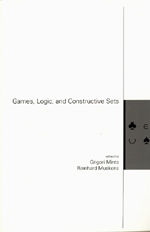
Games, Logic, and Constructive Sets
Edited by Grigori Mints and Reinhard Muskens
Mathematical game theory has been embraced by a variety of scholars:
social scientists, biologists, linguists, and now, increasingly,
logicians. This volume illustrates the recent advances of game
theory in the field. Logicians benefit from things like game
theory's ability to explain informational independence between
connectives; meanwhile, game theorists have even begun to benefit
from logical epistemic analyses of game states. In concert with such
pioneering work, this volume also present surprising developments in
classical fields, including first-order logic and set theory.
Grigori Mints is Professor of Philosophy and Professor (by Courtesy) of Mathematics and Computer Science at Stanford University. Reinhard Muskens is Associate Professor of Logic and Linguistics in the Department of Linguistics at Tilburg University.
I Logic and Games
- Logic and Game Theory: Close Encounters of the Third Kind
Johan van Benthem
- 1 Encounters of three kinds
- 2 Games from a logical viewpoint
- 2.1 Pictures
- 2.2 Games as models for logical languages
- 2.3 Intentional logic as usual
- 2.4 Major issues in process theories
- 3 Levels of representation
- 3.1 Games: from actions to outcomes
- 3.2 Actions in modal and dynamic logic
- 3.3 Powers and a forcing language
- 3.4 Intermediate game levels
- 4 Game operations and game algebra
- 4.1 Game operations
- 4.2 Game algebra
- 4.3 Languages
- 5 From finite to infinite games
- 6 Coping with imperfect information
- 6.1 From perfect to imperfect information
- 6.2 Uniform outcome equivalence and a forcing modality
- 6.3 Actions and information: dynamic-epistemic logic
- 7 Preferences and rational behavior
- 7.1 Game values, equilibrium and backward induction
- 7.2 Logic issues revisited
- 8 Conclusion
- Informationally Independent Connectives
Gabriel Sandu and Ahti Pietarinen
- 1 Sentential logic and games
- 1.1 Extensive games of perfect information
- 1.2 Extensive games of imperfect information
- 1.3 Extensive forms as Kripke frames
- 2 Informationally independent connectives
- 2.1 Games of perfect information
- 2.2 Semantical games of imperfect information
- 2.3 Informationally independent
- Descriptions of Game States
Hans van Ditmarsch, Wiebe van der Hoek, Barteld Kooi
- 1 Introduction
- 2 Epistemic logic
- 3 Description of Hexa
- 3.1 Derived characteristics of Hexa
- 4 Description of initial game states
- 4.1 Derived characteristics: factual knowledge
- 4.2 Derived characteristics: private knowledge
- 4.3 Derived characteristics: private ignorance
- 4.4 Derived characteristics: seedontknow
- 5 Description of the pre-initial state
- 6 Further observations
- 7 Conclusion
II Classical Logic
- Resource Consciousness in Classical Logic
Andreas Blass
- 1 Introduction
- 2 An Example
- 3 Herbrand's Theorem
- 4 Simple Herbrand Validity
- 5 Universal Simple Herbrand Validity
- 6 Modus Ponens
- 7 Connection with Affine Logic
- Quick Cut-Elimination for Monotone Cuts
Grigori Mints
- 1 Introduction
- 2 System LK
- 3 Cut-Elimination
III Constructive Set Theory
- The Anti-Foundation Axiom in Constructive Set Theories
Michael Rathjen
- 1 Introduction
- 2 The anti-foundation axiom
- 3 AFA in constructive set theory
- 3.1 The theory of CZFA
- 3.2 Interpreting AFA in Martin-Löf type theory
- 3.3 Upper bounds
- 3.4 Lower Bounds
- 4 Anti-foundation with inaccessible sets
- On Non-wellfounded Constructive Set Theory: Construction of Non-wellfounded Sets in Explicit Mathematics
Sergei Tupailo
- 1 Constructive Set Theory with Natural Numbers
- 2 Explicit Mathematics: a reminder
- 3 Realization of NCF‾ into EETJ
- Index
July 2003
ISBN (Paperback): 9781575864501
ISBN (Cloth): 9781575864495
|



Distributed by the
University of
Chicago Press
|


